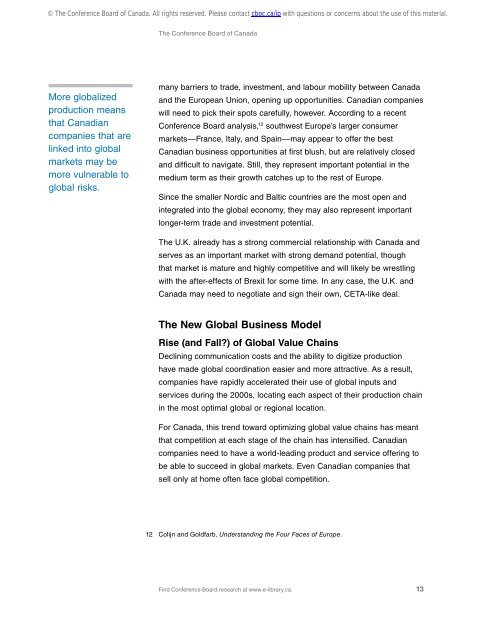Paradigm
8088-canadasnewtrade-en_rpt
8088-canadasnewtrade-en_rpt
You also want an ePaper? Increase the reach of your titles
YUMPU automatically turns print PDFs into web optimized ePapers that Google loves.
© The Conference Board of Canada. All rights reserved. Please contact cboc.ca/ip with questions or concerns about the use of this material.<br />
The Conference Board of Canada<br />
More globalized<br />
production means<br />
that Canadian<br />
companies that are<br />
linked into global<br />
markets may be<br />
more vulnerable to<br />
global risks.<br />
many barriers to trade, investment, and labour mobility between Canada<br />
and the European Union, opening up opportunities. Canadian companies<br />
will need to pick their spots carefully, however. According to a recent<br />
Conference Board analysis, 12 southwest Europe’s larger consumer<br />
markets—France, Italy, and Spain—may appear to offer the best<br />
Canadian business opportunities at first blush, but are relatively closed<br />
and difficult to navigate. Still, they represent important potential in the<br />
medium term as their growth catches up to the rest of Europe.<br />
Since the smaller Nordic and Baltic countries are the most open and<br />
integrated into the global economy, they may also represent important<br />
longer-term trade and investment potential.<br />
The U.K. already has a strong commercial relationship with Canada and<br />
serves as an important market with strong demand potential, though<br />
that market is mature and highly competitive and will likely be wrestling<br />
with the after-effects of Brexit for some time. In any case, the U.K. and<br />
Canada may need to negotiate and sign their own, CETA-like deal.<br />
The New Global Business Model<br />
Rise (and Fall?) of Global Value Chains<br />
Declining communication costs and the ability to digitize production<br />
have made global coordination easier and more attractive. As a result,<br />
companies have rapidly accelerated their use of global inputs and<br />
services during the 2000s, locating each aspect of their production chain<br />
in the most optimal global or regional location.<br />
For Canada, this trend toward optimizing global value chains has meant<br />
that competition at each stage of the chain has intensified. Canadian<br />
companies need to have a world-leading product and service offering to<br />
be able to succeed in global markets. Even Canadian companies that<br />
sell only at home often face global competition.<br />
12 Colijn and Goldfarb, Understanding the Four Faces of Europe.<br />
Find Conference Board research at www.e-library.ca.<br />
13


